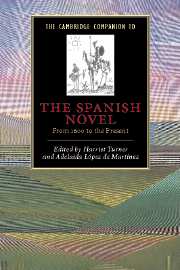Book contents
- Frontmatter
- 1 On the novel: mirror and text
- Part 1 Since Cervantes
- Part 2 The nineteenth century
- 4 The regional novel: evolution and consolation
- 5 The folletín: Spain looks to Europe
- 6 The realist novel
- 7 History and fiction
- 8 Gender and beyond: nineteenth-century Spanish women writers
- 9 Decadence and innovation in fin de siglo Spain
- Part 3 The twentieth century
- Bibliography
- Index
- Series List
9 - Decadence and innovation in fin de siglo Spain
from Part 2 - The nineteenth century
Published online by Cambridge University Press: 28 May 2006
- Frontmatter
- 1 On the novel: mirror and text
- Part 1 Since Cervantes
- Part 2 The nineteenth century
- 4 The regional novel: evolution and consolation
- 5 The folletín: Spain looks to Europe
- 6 The realist novel
- 7 History and fiction
- 8 Gender and beyond: nineteenth-century Spanish women writers
- 9 Decadence and innovation in fin de siglo Spain
- Part 3 The twentieth century
- Bibliography
- Index
- Series List
Summary
By the end of the nineteenth century, a deep sense of disillusionment and exhaustion had settled over Spain. While the perception of decay and lost opportunities was generally felt throughout Europe, in Spain the circumstances were particularly striking. Despite a century of enormous progress and changes, the Old World was ill at ease with itself, a feeling of crisis at hand. Somewhat belatedly, Spain, too, had participated in the economic and social advances of the period, but always with the awareness of having once been an empire. Indeed, by 1898 the loss of empire was almost total after the disastrous war with the United States in Cuba. The sense of having come undone nationally, however, coexisted paradoxically with another feeling: the growing suspicion that the nation had never really coalesced ideologically or historically. Both regionalistic and political differences became more pronounced at the same time, as elsewhere secularization signaled a crisis of spiritual and moral values. On a personal level, Unamuno expressed Spanish isolationism thus: “Every soul lives alone among other souls alone, in a naked, sterile desert, where they twist and turn like the poor spirits of skeletons shut inside their anemic skins.”
- Type
- Chapter
- Information
- The Cambridge Companion to the Spanish NovelFrom 1600 to the Present, pp. 138 - 152Publisher: Cambridge University PressPrint publication year: 2003



